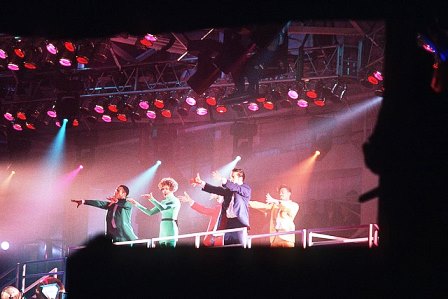Whitney Houston performs “This Day” at the VH1 Honours in 1995, as her voice dances among the angels, causing her to shudder as though brushed by their wings.
“Sometimes the church gets up in ya and I can’t help myself, you know,” she tells the roaring throng, who no doubt felt what she felt — the emotion that a few singers can achieve, and which Whitney Elizabeth Houston achieved more often and powerfully than almost anyone: The wonderful thrill down your spine, synapses firing, endorphins produced, a visceral form of delight.
Houston would have turned 60 today, August 9. Of course, she’s no longer with us, and although I, like many others, miss her every day, her voice – her amazing voice — continues to bring me delight.
According to the narrative, Whitney was playing with a hanger on her tongue as a newborn when her brother waved frantically and the hanger returned to her mouth. She yanked out the hanger, nearly missing her voice chords.
Houston’s talent might have been taken away by a simple twist of destiny, but instead the world got to witness it flourish. What made Houston’s voice so special? She possessed “the perfect vibrato” and a “incomparable timbre”; her voice was operatic at times, immensely expressive, strong and full and forceful; she had virtually superhuman vocal endurance, and she had the musicianship to back it all up (thanks to mother CeCe Houston). And, at her best, she made it appear so easy.
“Houston seemingly had no natural break between the high and low registers of her instrument,” Guthrie P. Ramsey Jr., a music professor at the University of Pennsylvania, wrote for CNN in 2012, on the occasion of Houston’s terrible death at the age of 48. “This distinct quality was highlighted because when she did switch into the ‘head voice,’ it was used as a subtle garnish, a valuable design element in a phrase.”
“And when she sang live, she was – unlike many others – able to replicate or surpass the same tone, power, and range she displayed on record on stage as well,” the site The Song Inside the Tune noted a year later.
In other words, Whitney Houston not only had range, but she was the range. She was and continues to be the benchmark by which all other singers will be measured. While her music is ageless, it is her live performances that really highlight Houston’s reputation as The Voice.
The film is a biopic. Whitney Houston: I Wanna Dance with Somebody chooses to bookend Houston’s life story with her performance at the 1994 American Music Awards, an epic 10-minute vocal free-for-all in which Houston performs, with little to no breaks, “I Loves You Porgy,” “And I’m Telling You (I’m Not Going),” and “I Have Nothing.”
“For many people, live performance is a measure of a performer’s true musicianship and ability to really engage with the music and capture an audience’s attention,” Andrew Mall, an assistant professor of music at Northeastern University, told Time in December. “She’s had these ups and downs with her physical well-being and ability to do it, but bringing this substantial, huge live performance for a nationwide broadcast really cements her position as a top diva and virtuosic performer.”
Aside from her brilliance, Houston’s hard performance schedule, drug addiction, and the sheer intensity with which she sang eventually ruined her voice and, with it, her life. So, even today, her music brings me a lot of pleasure, but it’s laced with a deep melancholy for what we had and what we lost.
More in Entertainment: https://buzzing.today/entertainment/
Photo Credits: https://commons.wikimedia.org/
